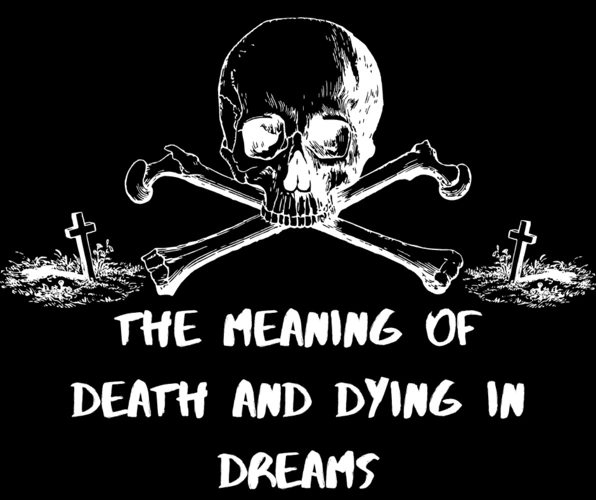Unraveling the Symbolism of Death in Dreams: Discovering the Meaning Behind Your Nighttime Visions
Dreams have long fascinated and perplexed humans, as they offer a window into our subconscious minds. Among the most enigmatic and thought-provoking dreams are those that involve death. In this article, we will embark on a deep exploration of the symbolism of death in dreams, seeking to unravel its mysterious meaning. Whether death appears as a metaphor for change, a representation of transformation, or a symbol of endings and new beginnings, we will delve into the different symbols and emotions associated with death in dreams. By understanding the underlying significance of these dreams, we can gain insight into our own lives, beliefs, and experiences. Join us on this captivating journey as we analyze the meaning behind death in dreams and learn how to interpret these profound symbols.
Understanding the Symbolism of Death in Dreams

Death in dreams often holds profound symbolic meaning, offering insights into our subconscious minds and emotions. By unraveling the symbolism of death in dreams, we can uncover hidden messages and gain a deeper understanding of ourselves. One interpretation of death in dreams is as a metaphor for change. Just as death represents the end of life, it can also symbolize the end of a particular phase or situation in our waking lives. It serves as a reminder that change is a natural part of life and can lead to new opportunities and personal growth. Another interpretation sees death in dreams as a representation of transformation. Like a caterpillar turning into a butterfly, death symbolizes the potential for inner transformation and spiritual growth. It signifies the shedding of old beliefs, habits, or identities, making way for a new and improved self. Additionally, death can be seen as a symbol of endings and new beginnings. It signifies the closure of one chapter in our lives and the start of something new, filled with fresh possibilities. Whether it represents the end of a relationship, a job, or a phase of life, death in dreams prompts us to embrace change and seize the opportunities that lie ahead. Understanding the symbolism of death in dreams allows us to reflect on our own experiences and emotions, leading to personal growth and self-discovery.
Please note: The article “Symbolic Meanings of Losing Teeth in Dreams” provides further insights into the symbolism of teeth in dreams.
1. Death as a Metaphor for Change
In the realm of dreams, death can serve as a powerful metaphor for change. When death appears in our dreams, it may not necessarily represent the physical end of life but rather heralds the conclusion of a particular phase or situation in our waking lives. Just as the cycles of life involve birth, growth, and eventual death, our personal journeys follow a similar pattern. The death symbol in dreams signifies the need for transformation and adaptation to new circumstances. It encourages us to embrace change and let go of the past. This metaphorical death can manifest in various ways, such as the end of a relationship, a job transition, or a shift in personal beliefs. While these transitions can be challenging and unsettling, they also present us with the opportunity for personal growth and self-discovery. Embracing the symbolism of death as a metaphor for change allows us to navigate life’s transitions with greater clarity and openness, propelling us toward new and exciting experiences.
Please note: For further exploration of symbolic meanings in dreams, you can read the article “Dreaming of Flying: Symbolism and Interpretation.”
2. Death as a Representation of Transformation
Death as a Representation of Transformation
In the realm of dreams, death can often be interpreted as a powerful symbol of transformation. Just as death marks the end of one phase of life, it signifies the potential for rebirth and renewal. This symbolism reflects the natural cycle of life, where the ending of one chapter paves the way for a new beginning. When death appears in dreams, it may indicate that a significant transformation is occurring within the dreamer’s psyche or external circumstances.
One way to understand the representation of transformation in death dreams is to consider the metaphor of a caterpillar turning into a butterfly. The caterpillar undergoes a complete metamorphosis, emerging as a beautiful creature with wings. Similarly, death in dreams can signify the shedding of old beliefs, behaviors, or situations that no longer serve us. It suggests that we are in the process of letting go of outdated aspects of ourselves and making room for personal growth and self-improvement.
This transformation may extend beyond the individual to encompass relationships, careers, or even spiritual beliefs. Dreaming of death can serve as a gentle nudge from the subconscious, urging the dreamer to embrace change and make positive transformations in their waking life.
It is important to note that death as a representation of transformation is not necessarily a negative or ominous sign. Instead, it highlights the potential for growth and evolution. By embracing the symbolism of death in dreams, we can navigate periods of transformation with a sense of purpose and openness to new possibilities.
Please note: The article “Dreaming of Flying: Symbolism and Interpretation” offers further insights into the symbolism of flying in dreams.
3. Death as a Symbol of Endings and New Beginnings
In dreams, death can serve as a powerful symbol of endings and new beginnings. It signifies the closure of one chapter in our lives and the emergence of something new and transformative. When death appears in our dreams, it is often a reflection of profound changes happening within ourselves or in our external circumstances. This symbolism encourages us to let go of the past and embrace the opportunities that lie ahead. In the face of death, we are compelled to reevaluate our priorities, reassess our goals, and make necessary changes to move forward. It prompts us to release attachments to situations, relationships, or aspects of our identity that no longer serve us. Just as the falling of autumn leaves heralds the coming of spring, death in dreams symbolizes the potential for growth and rebirth. It signifies the cycles of life and the continuous renewal that accompanies every ending. By embracing this symbolism, we can find the strength to navigate endings and transitions with grace and optimism, knowing that they pave the way for new beginnings. Understanding the symbolism of death as an embodiment of endings and new beginnings empowers us to approach life’s changes with a sense of hope and anticipation, ready to embark on a new and transformative journey.
Please note: The article “Dreaming of Flying: Symbolism and Interpretation” explores the symbolism behind dreams of flying and offers insights into its meaning.
Interpreting Different Death Symbols in Dreams

When exploring the symbolism of death in dreams, it is essential to interpret the various death symbols that may appear. One common death symbol is graveyards and burial sites. These represent endings, closure, and the need to let go of the past. The presence of graveyards in dreams signifies the need to embrace change and move forward in life. Another symbol is funerals and mourning. Dreaming of attending a funeral or experiencing grief suggests the need to address repressed emotions or unresolved issues. It is a reminder to confront and process emotions associated with loss. Skeletons and bones are also significant death symbols. They represent the bare essence of life, the very core of our existence. Skeletons can symbolize the acceptance of mortality and the impermanence of life, urging us to live fully and authentically. Lastly, there are symbols related to reincarnation and the afterlife. These symbols often reflect a belief in life beyond death and the concept of rebirth. They can convey a spiritual message or encourage reflection on the cycle of life and the eternal nature of the soul. Interpreting these different death symbols helps us unlock the hidden meanings within our dreams, providing us with valuable insights into ourselves and our subconscious minds.
Please note: For more information on the symbolism of teeth in dreams, you may find the article “Symbolic Meanings of Losing Teeth in Dreams” useful.
1. Graveyards and Burial Sites
Graveyards and burial sites are common symbols that represent death and mortality in dreams. When we dream of being in a graveyard, it can evoke feelings of sadness, loss, or even fear. These dreams often reflect our subconscious thoughts and emotions about death, whether it be a fear of our own mortality or the grief associated with losing a loved one. The graveyard itself serves as a powerful symbol of finality and the end of life. It can also be a reminder of the passage of time and the impermanence of our existence. Dreams featuring graveyards may also indicate a need for closure or resolution in our waking lives. It is important to consider the specific details and emotions associated with the dream to gain a deeper understanding of its meaning.
Please note: If you are interested in exploring the symbolism of teeth in dreams, you may find the article “Symbolic Meanings of Losing Teeth in Dreams” insightful.
2. Funerals and Mourning
Funerals and mourning are common symbols associated with death in dreams. When we dream of attending a funeral or experiencing the process of mourning, it can signify the end of something significant in our waking lives. Funerals represent a ceremonial rite of passage, a collective expression of grief and the acknowledgement of a loss. In the dream realm, funerals and mourning may symbolize the need to let go of the past or bid farewell to certain aspects of our lives. It can indicate the closure of a relationship, the end of a phase, or the loss of an opportunity. These dreams may also highlight feelings of sadness, sorrow, and the need for healing. They remind us to process our emotions and embrace the grieving process as a necessary part of moving forward. Funerals and mourning in dreams serve as a powerful metaphor, urging us to reflect on the significance of the loss and find ways to honor it. By giving ourselves permission to mourn, we can ultimately find healing and growth.
Note: To discover more about the symbolism of teeth in dreams, you can refer to the article “Symbolic Meanings of Losing Teeth in Dreams.”
3. Skeletons and Bones
The presence of skeletons and bones in dreams holds significant symbolism related to death. Skeletons, stripped of flesh, represent the bare essence of humanity and the inevitability of mortality. In dreams, they often symbolize the acceptance of mortality and the recognition of the impermanence of life. The image of bones can also suggest the idea of a foundation or structure. Just as bones support and shape the body in the physical realm, they can symbolize the underlying structure or framework of our lives. Dreams featuring skeletons and bones may indicate a need to examine the core aspects of our existence, such as our values, beliefs, and relationships, to ensure they are strong and stable. It can serve as a reminder to prioritize what truly matters and discard anything that no longer aligns with our values and goals. Additionally, the presence of skeletons and bones may evoke feelings of vulnerability and fragility. It highlights our own mortality and reminds us of the preciousness of life. Dreams involving skeletons and bones offer an opportunity for introspection and reflection on our own mortality, reminding us to live fully and appreciate the fleeting nature of existence.
Please note: The article “Symbolic Meanings of Losing Teeth in Dreams” provides further insights into the symbolism of teeth in dreams.
4. Reincarnation and the Afterlife
Reincarnation and the afterlife hold profound symbolism in dreams, offering insights into our beliefs about life beyond death. When death is symbolized as a gateway to reincarnation or the afterlife, it signifies a belief in the continuation of the soul’s journey. In these dreams, death becomes a transitional phase rather than an ultimate end. It suggests that there is more to existence than the physical realm and invites contemplation on the nature of our spiritual selves. Dreams that explore the concept of reincarnation may feature glimpses of past lives or encounters with familiar faces from different eras, indicating a sense of soulful continuity. Alternatively, dreams of the afterlife can take various forms, such as visions of heavenly realms, encounters with deceased loved ones, or experiences of profound peace and serenity. These dreams may provide comfort and reassurance, affirming the belief in an existence beyond our earthly lives. Exploring the symbolism of reincarnation and the afterlife in dreams can deepen our understanding of our spiritual perspectives and the eternal nature of the soul.
Please note: For further insights into dream symbolism, you may find the article “Dreaming of Flying: Symbolism and Interpretation” intriguing.
Common Emotions and Reactions in Death Dreams

In death dreams, a range of emotions and reactions can be experienced, reflecting the complex nature of our subconscious minds. One common emotion is fear and anxiety. The presence of death in dreams can evoke feelings of unease and apprehension, as it confronts us with mortality and the unknown. This fear may stem from our instinctual desire for self-preservation and the fear of losing loved ones. However, it is important to recognize that fear in dreams does not always represent literal fear, but rather the symbolic fear of facing change or letting go of the past. On the other hand, acceptance and peace are also common emotions in death dreams. Instead of fear, some individuals feel a sense of calm and acceptance when confronted with death symbolism. This acceptance may signify a readiness to let go, move on, or embrace the transformative power of change. It can also indicate a belief in the cyclic nature of life and the continuity of existence beyond death. Ultimately, the emotional reactions in death dreams are highly personal and can vary from individual to individual. It is essential to reflect on your own emotions and experiences to gain a deeper understanding of the messages that these dreams convey.
Please note: The article “Dreaming of Flying: Symbolism and Interpretation” explores the symbolism of flying dreams and offers insights into their interpretation.
1. Fear and Anxiety
Fear and anxiety are common emotions experienced in dreams featuring death. When death appears in dreams, it often triggers a sense of dread and unease. This fear can stem from our innate fear of the unknown and the inevitability of death in our waking lives. The symbolism of death in dreams can amplify these feelings, causing heightened anxiety and discomfort. The fear associated with death dreams can reflect our apprehension about change and the uncertainties that lie ahead. It may also arise from a fear of losing control or the fear of the unknown after death. Additionally, death dreams may evoke subconscious fears related to mortality and our own mortality. These dreams serve as a reminder of our own mortality and the limited time we have in this world. It is important to recognize that fear and anxiety in death dreams are natural reactions and should not be dismissed. They provide us with an opportunity to explore our fears, confront our mortality, and ultimately find ways to embrace life more fully. If you are interested in learning more about symbolic meanings in dreams, you can explore the fascinating article on the symbolic meanings of losing teeth in dreams.
2. Acceptance and Peace
Acceptance and peace are common emotions and reactions that may accompany death dreams. While death dreams can evoke fear and anxiety, they can also elicit feelings of acceptance and tranquility. In these dreams, individuals often encounter death calmly, without experiencing distress or panic. This emotional response indicates a sense of acceptance and the recognition that death is a natural part of life. It may signify a willingness to embrace the inevitability of change and the impermanence of existence. Dreams involving acceptance and peace in the face of death can be seen as an opportunity for self-reflection and inner growth. They may serve as a reminder to live in the present moment and appreciate the preciousness of life. These dreams can also provide solace and reassurance, reminding us that death is not something to be feared but rather a transition to a state of peace and eternal rest.
Please note: For a deeper understanding of the symbolic meanings of teeth in dreams, you can explore the article “Symbolic Meanings of Losing Teeth in Dreams.”
Factors Influencing the Symbolism of Death in Dreams

Factors Influencing the Symbolism of Death in Dreams:
1. Personal Beliefs and Cultural Background: Our personal beliefs and cultural background play a significant role in shaping the symbolism of death in our dreams. Different cultures have unique interpretations and associations with death, which can subconsciously influence our dream symbolism. For example, in some cultures, death represents a transition to the afterlife, while in others, it may signify the end of a cycle or the opportunity for rebirth and reincarnation. Our personal beliefs about death, such as religious or spiritual views, also contribute to the symbolism we perceive in our dreams. Our individual understanding and perception of death can color the meaning we assign to death-related symbols in our dreams.
2. Recent Life Events and Experiences: The events and experiences we encounter in our waking lives can greatly influence the symbolism of death in our dreams. Traumatic or significant life events, such as the loss of a loved one, can manifest in our dream symbolism. Dreams containing death symbols may serve as a means for us to process grief, cope with loss, or reflect on the impact of these experiences. Similarly, major life changes, such as career transitions, relationship shifts, or personal transformations, can also contribute to the appearance of death in our dreams. The symbolism of death may represent the endings and new beginnings associated with these life events.
By considering these factors, we can gain a deeper understanding of the symbolism of death in our dreams and how it relates to our personal experiences and beliefs.
Please note: For further exploration of dream symbolism, you may find the article “Dreaming of Flying: Symbolism and Interpretation” insightful.
1. Personal Beliefs and Cultural Background
Personal beliefs and cultural background play a significant role in shaping the symbolism of death in dreams. Our individual ideologies, religious or spiritual beliefs, and cultural understanding of death influence how we perceive and interpret these dream symbols. For example, in some cultures, death is viewed as a natural part of the life cycle, representing the continuation of the soul’s journey or a transition to another realm. In such cases, death in dreams may be seen as a positive symbol, signaling spiritual growth or a connection with ancestors. Conversely, cultures that perceive death as a negative or fearful concept may interpret death in dreams as a reflection of anxiety or fear of loss.
The personal beliefs we hold about death also impact our interpretation of death symbols in dreams. If an individual embraces the idea of death as a transformative process, they may view death in dreams as a representation of personal growth or a call for change. On the other hand, someone who fears death may experience anxiety or distress when encountering death symbols in their dreams.
It is essential to acknowledge the cultural and personal context when attempting to understand the symbolism of death in dreams. By recognizing these influences, we can gain a more nuanced interpretation of our dream experiences and how they relate to our beliefs and background.
Please note: For further exploration of symbolic meanings in dreams, you may find the article “Dreaming of Flying: Symbolism and Interpretation” insightful.
2. Recent Life Events and Experiences
Recent life events and experiences can significantly influence the symbolism of death in dreams. Our dreams often serve as a reflection of our waking lives, and the emotions and themes we experience during the day can find their way into our subconscious minds as we sleep. These dreams can be directly related to a specific event or experience that has left a significant impact on us. For example, the death of a loved one or the end of a meaningful relationship can manifest in dreams as symbols of death, highlighting the grief, loss, and emotional turmoil associated with these experiences. Similarly, major life transitions such as changing jobs, moving to a new place, or starting a new chapter can trigger death-related dreams. These dreams can serve as a processing mechanism, allowing us to make sense of and come to terms with the changes and uncertainties that these events bring. Dreams act as a canvas upon which we can explore and process emotions, fears, and challenges. By examining the recent life events and experiences that have occurred, we can gain valuable insights into the symbolism of death in dreams and better understand its personal significance.
Please note: If you’re interested in exploring the symbolic meanings of other dream scenarios, you may find the article “Dreams of Flying: Symbolism and Interpretation” insightful.
Tips for Analyzing and Understanding Your Death Dreams
Understanding the symbolism of death dreams requires careful analysis and introspection. Here are some valuable tips to help you interpret and make sense of these profound experiences:
- Keep a Dream Journal: To gain insights into your death dreams, start by keeping a dream journal. Record the details of your dreams immediately upon waking, including any emotions, symbols, or events that stood out to you. Over time, patterns may emerge, providing clues to the deeper meaning of your dreams.
- Reflect on Your Emotions: Pay attention to the emotions you experienced during the dream. Did you feel fear, anxiety, acceptance, or peace? Emotions can serve as powerful indicators of your subconscious thoughts and feelings, offering valuable insights into the symbolism of death in your dreams.
By utilizing these tips, you can begin to unravel the intricate symbolism woven into your death dreams and gain a clearer understanding of their meaning and significance.
Please note: The article “Dreams Chased and Unlocked: Decoding the Symbolism” offers further insights into the symbolism of being chased in dreams.
1. Keep a Dream Journal
Keeping a dream journal is a valuable tool for analyzing and understanding your death dreams. By recording your dreams immediately upon waking, you can capture the details and emotions while they are still fresh in your mind. This practice allows you to revisit your dreams later and look for patterns or recurring themes related to death symbolism. Writing down the symbols, images, and feelings associated with death in your dreams can provide valuable insights into their meaning. Additionally, a dream journal can help you identify connections between your dreams and real-life experiences, as well as track any changes or progress in your dream symbolism over time. The act of recording your dreams also encourages a deeper level of self-reflection and introspection. You may discover underlying emotions or subconscious thoughts that are influencing your dream experiences. By analyzing your death dreams in the context of a dream journal, you can gain a better understanding of yourself and the symbolism that manifests in your dreams.
Please note: For further exploration of dream symbolism, you can check out the article “Dreaming of Flying: Symbolism and Interpretation.”
2. Reflect on Your Emotions
Reflecting on your emotions is an essential step in understanding the symbolism of death in dreams. When it comes to interpreting these dreams, it is crucial to consider how you felt during the dream and upon waking. Emotions can serve as valuable clues to the underlying meaning of the dream. Did you feel fear and anxiety in the presence of death? This could indicate deep-seated fears or uncertainties in your waking life that need to be addressed. On the other hand, if you experienced acceptance and peace in the face of death, it might suggest a readiness for change or an acceptance of endings and new beginnings. Pay attention to the intensity and overall tone of your emotions. Are they overwhelming or fleeting? Are they predominantly negative or positive? Understanding your emotional response to the symbolism of death in dreams can provide valuable insights into your subconscious desires, fears, and beliefs. By reflecting on your emotions, you can gain a deeper understanding of the messages your dreams are trying to convey and how they relate to your waking life.
Please note: The article “Dreaming of Flying: Symbolism and Interpretation” explores the symbolism behind dreams of flying and their possible meanings.
Conclusion
In conclusion, understanding the symbolism of death in dreams can provide valuable insights into our inner thoughts, emotions, and experiences. Dreams involving death serve as metaphors for change, representing the end of one phase and the beginning of another. They also symbolize transformation, reminding us of our potential for personal growth and development. Moreover, death in dreams signifies endings and new beginnings, encouraging us to embrace change and seize new opportunities. Through analyzing our death dreams and reflecting on the associated emotions, we can gain a deeper understanding of ourselves and navigate our waking lives with renewed clarity and purpose. Keeping a dream journal, reflecting on our emotions, and considering our personal beliefs and cultural background can all aid in interpreting and unraveling the symbolism of death in dreams. By exploring the depths of our subconscious through dream analysis, we can embark on a meaningful journey of self-discovery.
Frequently Asked Questions
1. Can death in dreams predict actual physical death?
No, death in dreams does not predict actual physical death. Dreams are a manifestation of our subconscious mind and often use symbolic language to convey our thoughts, emotions, and experiences. While death dreams can be intense and thought-provoking, they should not be interpreted as literal predictions of death.
2. What if I dream about someone else’s death?
Dreaming about someone else’s death could symbolize a change or transformation happening in that person’s life or your relationship with them. It may not necessarily mean that harm will come to them. Reflect on your feelings towards that person and the context of the dream to gain a better understanding of its meaning.
3. Can death dreams be positive or have a different meaning?
Yes, death dreams can have positive or metaphorical meanings. They can represent the end of a challenging situation, the opportunity for personal growth, or the start of a new chapter in life. It’s important to consider the emotions and symbols present in the dream to interpret its unique meaning accurately.
4. Can recurring death dreams have specific interpretations?
Recurring death dreams may indicate unresolved emotions or recurring themes in your waking life. It could be a signal to address certain issues, confront fears, or make necessary changes in your life. Keeping a dream journal and exploring common elements in the dreams can help uncover specific interpretations.
5. Why do some people have more death dreams than others?
People have different dream patterns and frequencies, influenced by various factors such as personality, stress levels, and current life circumstances. Some individuals may naturally have more death dreams due to their increased focus on mortality, while others may have a different dream imagery based on their own psychological makeup.
6. Can religious beliefs influence the symbolism of death in dreams?
Yes, religious beliefs can shape the symbolism of death in dreams for individuals who hold them. The interpretation of death dreams may vary based on cultural and religious backgrounds. It’s important to consider personal beliefs and the context of the dream when interpreting its symbolism.
7. How can I overcome fear and anxiety from death dreams?
If death dreams evoke fear and anxiety, it can be helpful to explore the underlying emotions and their connections to your waking life. Practicing relaxation techniques, such as deep breathing or meditation, can also aid in managing fear and anxiety associated with these dreams.
8. Can the symbolism of death in dreams provide guidance for personal growth?
Absolutely. Understanding the symbolism of death in dreams can offer valuable insights into personal growth and self-discovery. By reflecting on the emotions and symbols present in the dream, you can gain a deeper understanding of yourself, your desires, and the changes you may need to make in your life.
9. Should I seek professional help if death dreams become overwhelming?
If death dreams become overwhelming or significantly impact your daily life, it may be beneficial to seek professional help, such as speaking with a therapist or counselor. They can provide guidance and support in understanding and processing these dreams in a healthy way.
10. Can interpreting death dreams help with coping with grief?
Yes, interpreting death dreams can potentially aid in coping with grief. Dreams can be a way for the subconscious mind to process emotions and experiences related to loss. Analyzing the symbolism and exploring the emotions present in death dreams may facilitate the healing process and provide insights into the grieving journey.








